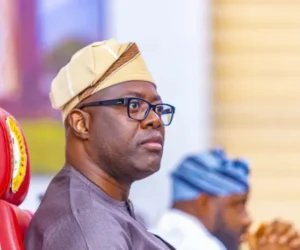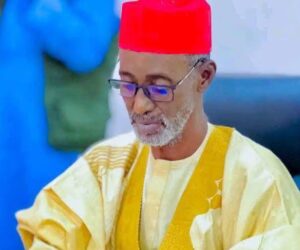1
…As Tinubu Seeks $2.3bn External Loan For Budget Deficit, Others
…FG Unveils $100m Carbon Project To Boost Green Growth Agenda
Nigeria’s external debt servicing costs jumped sharply in August 2025, highlighting the increasing pressure on government finances despite improved foreign exchange liquidity and a rebound in reserves.
According to the latest data from the Central Bank of Nigeria (CBN), external debt service payments rose by 68 percent month-on-month (m/m) to $302.3 million, up from $179.9 million in July.
This marks one of the steepest monthly increases in recent years and contrasts with the 25 percent m/m growth recorded in the previous month, signalling growing fiscal strain as the Federal Government continues to balance rising debt obligations with limited revenue expansion.
On a year-on-year (y/y) basis, how ever, the growth was modest, up by just 8 percent, reflecting some relative stability compared with 2024. Yet, analysts warn that the trend could worsen in the coming months as new disbursements from multilateral and bilateral partners mature and interest payments rise on recently contracted loans.
Debt Servicing Dominates FX Outflows
In August, external debt service payments accounted for approximately 63 percent of Nigeria’s total foreign exchange outflows, making it the single largest component of international payments for the month. This underscores how much external debt servicing is beginning to dominate the nation’s FX commitments, potentially crowding out other critical foreign payments such as import bills and external obligations of government agencies.
Cumulatively, between January and August 2025, Nigeria spent about $2.9 billion on external debt servicing, compared with $3.1 billion recorded during the same period in 2024. While the slight year-to-date decline indicates some reprieve, analysts say it reflects more on the timing of payments and restructured obligations rather than any fundamental reduction in debt levels.
According to CBN data, Nigeria’s total public debt stock— comprising domestic and external obligations—stood at about N121 trillion (approximately $90 billion) as of mid-2025, following fresh borrowings to fund infrastructure projects and bridge budget deficits. Of this, external debt accounts for around 38 percent, with servicing obligations denominated in foreign currencies—mainly the U.S. dollar—posing a consistent strain on fiscal stability.
Domestic Borrowing Still The Mainstay
Despite the sharp uptick in external debt payments, the Federal Government has continued to rely predominantly on the domestic debt market to finance its budget shortfall. With elevated global interest rates and cautious investor appetite for emerging-market Eurobonds, domestic instruments—such as FGN bonds, Sukuk, and treasury bills—remain the preferred route for funding.
However, domestic borrowing also carries its own risks, including higher yields that inflate local interest costs and crowd out private-sector access to credit. Analysts at United Capital Research note that while external debt service rose in August, the “relative stability of the exchange rate compared with 2024 has helped ease the dollar-denominated burden.”
In 2024, the sharp depreciation of the naira had amplified the cost of servicing dollar debts, forcing the government to commit a larger share of revenue to FX obligations. This year, the improved performance of the local currency and gradual return of FX inflows have provided some breathing room, even as nominal payments climb.
Reserves Rise Despite Outflows
In a counterintuitive twist, Nigeria’s external reserves have continued to rise, even amid growing external debt obligations. The CBN reported that the reserves position increased by $1.1 billion month-on-month to $42.4 billion at the end of September 2025, up from $41.3 billion in August.
Year-to-date, reserves have grown by approximately $1.5 billion, signalling a sustained improvement in the country’s external liquidity profile.
Economists attribute this resilience to improved FX earnings from crude oil exports, strong diaspora remittances, and renewed foreign capital inflows, especially portfolio investments in the debt and equity markets following policy reforms that restored investor confidence.
Nigeria’s average crude oil output has remained above 1.6 million barrels per day, the highest in two years, supported by better pipeline security and reduced theft. Meanwhile, remittance inflows—traditionally a key non-oil source of FX—have rebounded strongly as global economic conditions improve, adding an estimated $22 billion annually to inflows.
The combined effect has been a gradual rebuilding of reserves, bolstering the CBN’s capacity to stabilise the naira and meet maturing external obligations without depleting the buffer.
Stronger Naira, Softer Debt Pressure
The naira’s appreciation in recent months has also contributed to easing external debt pressure. Improved FX liquidity in the official window, a result of increased supply from the CBN and autonomous sources, has led to a narrowing of the parallel-market premium.
As of late September, the naira traded around N1,150/$ in the official market, compared to nearly N1,450/$ mid-year—a gain of more than 20 percent. This appreciation, analysts say, reduces the local-currency value of external debt service payments and helps limit the fiscal impact.
A report by CardinalStone Research noted that “the ongoing appreciation of the naira, coupled with steady reserve accretion, could limit Nigeria’s external debt exposure in the near term and improve confidence in the government’s fiscal management.”
However, the firm cautioned that sustained improvement would depend on maintaining FX supply, curbing speculative demand, and keeping oil production stable.
Rising Borrowing Ahead
Looking ahead, financial analysts expect external debt servicing to rise further in the fourth quarter of 2025, as disbursements from recently approved multilateral loans begin to crystallise. Nigeria has secured several concessional facilities from the World Bank, African Development Bank, and Islamic Development Bank for energy transition, infrastructure, and budget support.
While these loans typically come at lower interest rates, their cumulative effect could elevate overall debt-service obligations. Fiscal experts argue that without significant revenue growth—particularly non-oil revenue—the rising debt-service ratio could erode fiscal flexibility.
According to the Debt Management Office (DMO), debt service already consumes over 70 percent of Nigeria’s total revenue, a ratio widely seen as unsustainable.
The World Bank and IMF have both advised Nigeria to expand its tax base and accelerate fiscal reforms to reduce reliance on borrowing.
Experts Call For Fiscal Discipline
Commenting on the data, Lagos-based economist Dr. Johnson Chukwu said the rise in debt service payments “reflects the structural weakness in Nigeria’s fiscal system.”
“While external reserves are rising, the underlying problem is that we’re still borrowing faster than we’re earning. The improved reserves offer relief, but they don’t erase the debt problem,” he said.
He added that the government must prioritise debt sustainability by improving tax collection, rationalising subsidies, and ensuring that borrowed funds are invested in projects that generate measurable returns.
Similarly, Muda Yusuf, CEO of the Centre for the Promotion of Private Enterprise (CPPE), urged the government to strengthen its medium-term debt strategy.
“We should reduce commercial borrowing, focus on concessional sources, and expand domestic revenue through reforms in Customs, VAT, and mining,” he advised.
Tinubu Seeks $2.3bn External Loan For Budget Deficit, Others
Meanwhile, President Bola Tinubu has formally written to the House of Representatives, seeking legislative approval to raise a total of $2.347 billion in external loan as well as permission to issue a stand-alone Sovereign Sukuk worth $500 million on the international market.
The president’s request, contained in a letter read by Speaker Tajudeen Abbas during Tuesday’s plenary, seeks authorisation for the Federal Government to secure new foreign borrowing of N1.843 trillion, equivalent to about $1.229 billion at the 2025 budget exchange rate of $1/ N1,500.
The funds, Tinubu explained, are intended to part-finance the 2025 budget deficit and refinance an existing $1.118 billion Eurobond maturing later this year.
According to the president, the proposed borrowing will be raised through one or a combination of instruments in the International Capital Market (ICM), including Eurobond issuance, loan syndications, bridge financing from bookrunners, or direct loans from international financial institutions.
Tinubu further explained that the 2025 Appropriation Act approved N9.27 trillion in new borrowing to finance the budget deficit, of which N1.843 trillion — about $1.229 billion — will be sourced externally.
He noted that Nigeria’s $1.118 billion Eurobond, issued in November 2018 at 7.625% with a seven-year maturity, will mature on November 21, 2025. To avoid a potential default, he said the government plans to refinance the bond using one or more of the listed funding options.
“This is a standard practice in global debt markets,” the letter stated. “The resolution of the House is therefore required to authorise the Federal Government to refinance the maturing Eurobond accordingly.”
When combined with the new borrowing requirement, the total amount Nigeria intends to raise stands at $2.347 billion. Tinubu expressed confidence that Nigeria, as a regular issuer of Eurobonds, can successfully attract the required capital, subject to market conditions.
He added that the terms and conditions of the borrowing would be determined at the time of issuance and guided by prevailing market dynamics.
The Federal Ministry of Finance and the Debt Management Office (DMO), he said, would work closely with transaction advisers to secure the most favourable terms for the country.
In addition to the external borrowing plan, President Tinubu also asked the House to approve the issuance of a stand-alone debut Sovereign Sukuk of up to $500 million in the international market, with or without a credit guarantee.
The president highlighted Nigeria’s previous successes with Sukuk bonds in the domestic capital market. Between September 2017 and May 2025, the DMO raised about N1.392 trillion through Sukuk issuances to finance critical road infrastructure projects across the country. Expanding into the international Islamic finance market, he argued, would help bridge Nigeria’s infrastructure funding gap, diversify the country’s investor base, and deepen the Federal Government’s securities market.
Tinubu explained that the proposed Sukuk issuance could be guaranteed by the Islamic Corporation for the Insurance of Investment and Export Credit (ICIEC), a member of the Islamic Development Bank (IsDB) Group.
The president stressed that approval of the request is crucial for supporting Nigeria’s fiscal plans, refinancing existing debt obligations, and unlocking new funding sources to accelerate infrastructure development.
FG Unveils $100m Carbon Project To Boost Green Growth Agenda
The Federal Government is advancing its green growth agenda with the launch of the $100 million Orteva Carbon Project, a major initiative designed to unlock climate finance, generate carbon credits, and accelerate the country’s transition to a sustainable economy, Federal Ministry of Finance has said.
The landmark project was highlighted by the Minister of Finance and Coordinating Minister of the Economy, Mr. Wale Edun, during strategic discussions held in Abuja with a delegation from Orteva, in partnership with the Delta State government and Eighth Versa.
According to a statement signed by Mohammed Manga, Director of Information and Public Relations, describing the project as a timely intervention, Edun emphasised the project’s alignment with President Bola Ahmed Tinubu’s vision of green growth and sustainable economic transformation.
The initiative forms a core part of Nigeria’s Energy Transition Plan and aims to diversify government revenue beyond oil, attract foreign exchange, and create jobs for Nigerians.
With efforts including mangrove conservation and biochar production, the Orteva Carbon Project is projected to generate between $350 million and $2.8 billion in carbon credit revenue, establishing Nigeria as a leading hub for credible carbon trading in Africa.
Minister Edun assured that the government is committed to developing a transparent carbon market framework with robust governance and pricing mechanisms.
Highlighting opportunities for the private sector, he noted that the project offers avenues to invest in environmentally protective initiatives that deliver sustainable economic returns.








